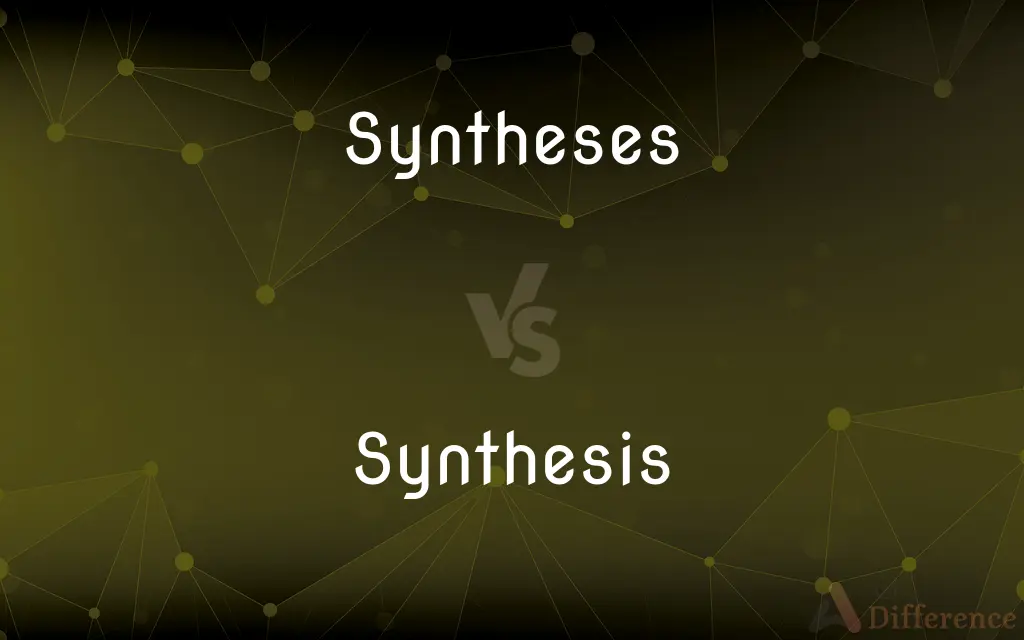Syntheses vs. Synthesis — What's the Difference?
By Maham Liaqat & Fiza Rafique — Updated on March 7, 2024
Syntheses are multiple instances or forms of combining elements, while synthesis refers to the singular process of combination.

Difference Between Syntheses and Synthesis
Table of Contents
ADVERTISEMENT
Key Differences
Synthesis is the process of combining two or more components to form a new, unified entity. It involves the integration of disparate elements to create a coherent whole, often used in the context of chemical reactions, philosophical arguments, or literary analyses. Syntheses, on the other hand, is simply the plural form of synthesis, indicating multiple instances or varieties of such combination processes. While synthesis focuses on a single act of integration, syntheses encompass a range of such acts or the results thereof.
In the realm of chemistry, synthesis refers to the methodical combination of chemical elements or compounds to form a new compound. This singular term emphasizes the unity and specificity of the process, highlighting the method and result of combining specific reactants. Syntheses, however, implies a discussion or review of multiple chemical reactions or synthesis processes, each leading to different compounds or materials. The distinction here underscores the difference between focusing on one chemical process versus exploring several.
When discussing philosophical ideas or arguments, synthesis is used to describe the process of integrating different ideas or theories to form a new, cohesive theory. It represents the intellectual effort to unify various viewpoints into a singular, coherent perspective. Syntheses, in contrast, would refer to various instances where such integrative efforts have been made, indicating a collection of unified theories or perspectives derived from diverse philosophical standpoints.
In literature and art, synthesis might refer to the technique of blending different genres, styles, or elements to create a new form of expression. This singular term highlights the creativity and innovation involved in producing a singular work that integrates various influences. Syntheses, conversely, would point to multiple works or efforts where such creative integration has been achieved, showcasing a variety of expressions that merge disparate elements into unified works.
The usage of synthesis versus syntheses also reflects in academic and research contexts. A researcher might discuss the synthesis of new materials, focusing on a specific process and outcome. In contrast, when reviewing the literature or the field, the researcher might refer to syntheses of materials, indicating the examination of various processes and outcomes that have been achieved in the study area.
ADVERTISEMENT
Comparison Chart
Definition
Singular process of combining elements
Plural form, indicating multiple processes
Context Usage
Specific instance or example
General discussion involving multiple instances
Emphasis
On the unity and coherence of combining
On the diversity and range of combination efforts
Application Fields
Chemistry, philosophy, literature, art
Same fields, but referencing multiple examples
Implication
Focus on the method and outcome of one process
Overview of various methods and outcomes
Compare with Definitions
Syntheses
Refers to creating a new compound by combining elements.
The synthesis of water from hydrogen and oxygen was a groundbreaking demonstration.
Synthesis
Multiple instances of combining elements in various contexts.
The conference explored syntheses in renewable energy technologies.
Syntheses
The integration of diverse ideas into a cohesive theory.
His synthesis of historical materialism and existentialism offered a novel perspective.
Synthesis
Different efforts to integrate theories across disciplines.
The book chapters detail syntheses of ethics and economics.
Syntheses
Developing new materials or technologies through combination.
The synthesis of this biodegradable plastic could revolutionize packaging.
Synthesis
A range of developed technologies or materials.
The review highlights syntheses of sustainable construction materials.
Syntheses
Blending genres or styles to create new narrative forms.
Her synthesis of science fiction and historical fiction captivated readers.
Synthesis
Various methods of creating compounds or materials.
His paper reviewed recent syntheses of nanoparticles for medical use.
Syntheses
The process of combining different elements to form a unified whole.
The synthesis of data from various sources provided a comprehensive view.
Synthesis
Multiple works that blend different narrative styles or themes.
The anthology includes syntheses of poetry and flash fiction.
Syntheses
The combining of separate elements or substances to form a coherent whole.
Synthesis
The combining of separate elements or substances to form a coherent whole.
Syntheses
The complex whole so formed.
Synthesis
The complex whole so formed.
Syntheses
(Chemistry) Formation of a compound from simpler compounds or elements.
Synthesis
(Chemistry) Formation of a compound from simpler compounds or elements.
Syntheses
Reasoning from the general to the particular; logical deduction.
Synthesis
Reasoning from the general to the particular; logical deduction.
Syntheses
The combination of thesis and antithesis in the Hegelian dialectical process whereby a new and higher level of truth is produced.
Synthesis
The combination of thesis and antithesis in the Hegelian dialectical process whereby a new and higher level of truth is produced.
Synthesis
The formation of something complex or coherent by combining simpler things.
Synthesis
(signal processing) Creation of a complex waveform by summation of simpler waveforms.
Synthesis
(chemistry) The reaction of elements or compounds to form more complex compounds.
Synthesis
(logic) A deduction from the general to the particular.
Synthesis
(philosophy) The combination of thesis and antithesis.
Synthesis
(military) In intelligence usage, the examining and combining of processed information with other information and intelligence for final interpretation.
Synthesis
(rhetoric) An apt arrangement of elements of a text, especially for euphony.
Synthesis
(grammar) The uniting of ideas into a sentence.
Synthesis
(medicine) The reunion of parts that have been divided.
Synthesis
Composition, or the putting of two or more things together, as in compounding medicines.
Synthesis
The art or process of making a compound by putting the ingredients together, as contrasted with analysis; thus, water is made by synthesis from hydrogen and oxygen; hence, specifically, the building up of complex compounds by special reactions, whereby their component radicals are so grouped that the resulting substances are identical in every respect with the natural articles when such occur; thus, artificial alcohol, urea, indigo blue, alizarin, etc., are made by synthesis.
Synthesis
The combination of separate elements of thought into a whole, as of simple into complex conceptions, species into genera, individual propositions into systems; - the opposite of analysis.
Analysis and synthesis, though commonly treated as two different methods, are, if properly understood, only the two necessary parts of the same method. Each is the relative and correlative of the other.
Synthesis
The process of producing a chemical compound (usually by the union of simpler chemical compounds)
Synthesis
The combination of ideas into a complex whole
Synthesis
Reasoning from the general to the particular (or from cause to effect)
Common Curiosities
Can synthesis be used in a non-scientific context?
Yes, synthesis is used in various contexts, including integrating ideas in philosophy or blending styles in literature and art.
Why is the distinction between synthesis and syntheses important?
The distinction clarifies whether one is discussing a singular process and its outcome or multiple instances of such processes.
How do synthesis and syntheses differ in chemistry?
Synthesis focuses on a single chemical process to create a compound, while syntheses discuss multiple such processes and their products.
What is synthesis?
Synthesis is the process of combining multiple elements into a coherent whole, applicable in chemistry, philosophy, literature, and beyond.
What are syntheses?
Syntheses refer to multiple instances or varieties of synthesis, indicating a range of combination processes or outcomes.
How does synthesis apply to literature?
In literature, synthesis involves blending genres, styles, or themes to create new, innovative forms of expression.
What is an example of synthesis in everyday life?
An example includes the synthesis of culinary techniques to create fusion cuisine, blending elements from different culinary traditions.
What role does synthesis play in research and development?
Synthesis is crucial in R&D for creating new materials, technologies, or products through innovative combination methods.
Is there a preference for synthesis or syntheses in academic writing?
The preference depends on the context: synthesis for focusing on a specific process, syntheses for discussing a range of processes.
How do synthesis and syntheses impact learning?
They promote critical thinking and creativity by encouraging the integration of varied knowledge and perspectives.
Can syntheses lead to innovation?
Yes, examining multiple syntheses can inspire new approaches and solutions, driving innovation across fields.
Are synthesis and syntheses interchangeable?
While related, they are not interchangeable; synthesis refers to a singular process, and syntheses to multiple instances.
How do syntheses contribute to academic research?
Syntheses provide a comprehensive overview of various approaches and outcomes in a research field, enhancing understanding.
How do syntheses affect philosophical discourse?
Syntheses in philosophy help integrate diverse theories, fostering richer, more nuanced understandings of complex concepts.
Why is understanding synthesis important in science?
Understanding synthesis is crucial for grasping how complex compounds and materials are created, impacting developments in science and technology.
Share Your Discovery

Previous Comparison
Safeness vs. Safety
Next Comparison
Sick vs. UnhealthyAuthor Spotlight
Written by
Maham LiaqatCo-written by
Fiza RafiqueFiza Rafique is a skilled content writer at AskDifference.com, where she meticulously refines and enhances written pieces. Drawing from her vast editorial expertise, Fiza ensures clarity, accuracy, and precision in every article. Passionate about language, she continually seeks to elevate the quality of content for readers worldwide.
















































